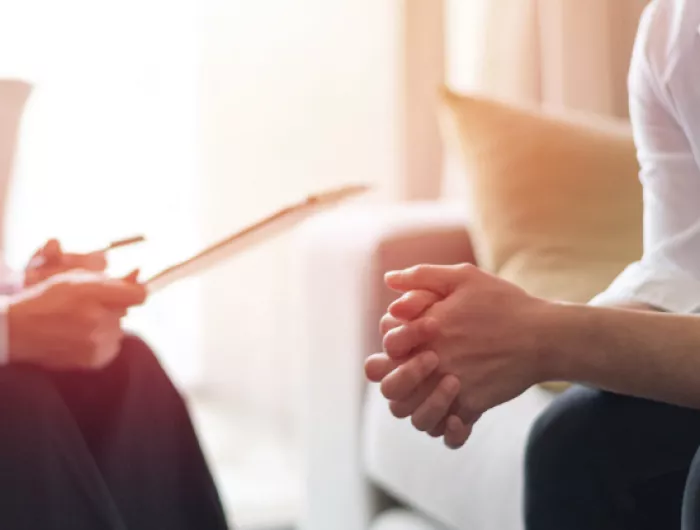An expert's take on the evidence for managing stress and anxiety

Khunatorn/stock.adobe.com.
This content is free. Because CSPI takes no corporate or government donations, we rely on supporters like you to fuel our content. Donate now. |

Elizabeth Hoge is a board-certified psychiatrist and director of the Anxiety Disorders Research Program at the Georgetown University School of Medicine. Her research focuses on treatment for stress and anxiety disorders, including psychotherapy, medication, and mindfulness meditation. Hoge spoke with Nutrition Action’s Caitlin Dow.
Anxiety 101
Q: What’s the difference between stress and anxiety?
A: Stress is a temporary state that’s created when someone feels like the demands of life exceed their capacity to respond. You could be stressed about the pandemic, new demands at work, changes in relationships, and so on.
In contrast, anxiety is a state of worry about potential future negative events, and it exists on a continuum. Everyone experiences some level of anxiety. But if it persists and becomes severe or interferes with someone’s work or their relationships, that can land them with an anxiety disorder diagnosis.
Q: What might people worry about?
A: People with generalized anxiety disorder worry about future possible threats, like whether they made the right career choice or what might go wrong on an upcoming road trip. They can get stuck in a worry loop and convince themselves that if they worry, they have control over a situation.
Others—like those with panic disorder or social anxiety disorder—experience fear, discomfort, or panic around certain stimuli, like driving or social gatherings. They avoid those situations or activities, so their lives can become very restricted.
Q: What should you do if you think you have an anxiety disorder?
A: People have a tendency to self-diagnose and pursue self-treatment, but that’s risky because there’s an overlap between anxiety disorders and depression. So it’s important to meet with a therapist to get a formal diagnosis and then work to create a treatment plan.
[Looking for a cognitive behavioral therapist? You can search by ZIP code at locator.apa.org.]
Psychotherapy & drugs
Q: Can therapy help?
A: Yes. There are two main forms of psychotherapy—or talk therapy—that we use for anxiety disorders. One is traditional exploratory therapy. You talk about whatever comes to mind and your therapist helps you identify, understand, and let go of thoughts and behaviors that lead to anxiety. It’s effective, but it may take a long time to see results.
The other form—cognitive behavioral therapy, or CBT—is the gold standard for treating anxiety.
Q: How does it work?
A: In the cognitive part, we’re trying to identify, then neutralize, habitual negative thought patterns. People learn to disrupt their worry loop.
In the behavioral part, we expose people to their anxiety-provoking stimuli in a controlled, safe context. So if they’re afraid of driving, maybe we have them ride as a passenger in a car first. And then we’ll build to driving one block. Very small steps.
With repetition, the brain can start to learn that the feared stimulus isn’t scary.
Q: Why is CBT the gold standard?
A: It works. In studies, CBT is about three times more effective than typical counseling. It fundamentally changes the way someone thinks.
It also works quickly. It’s usually just 8 to 12 sessions plus homework. If a person commits to the homework, they may have successful treatment in 8 weeks.
Q: Do medications work?
A: I’m convinced that for some people, drugs will be the most effective treatment. And because the drugs are tested in hundreds of people before getting approved by the FDA, there’s good evidence that they work for many people. But if someone stops taking drugs, the anxiety can come back. Your doctor can help you decide if meds make sense for you.
Mind-body techniques
Q: Didn’t you recently test CBT against yoga?
A: Yes. We wanted to know if yoga was as effective as CBT. So we randomly assigned 226 people with generalized anxiety to either CBT, yoga, or a stress-education control group. Each of the three groups met for two hours a week for 12 weeks, and everyone was assigned 20 minutes of homework a day where they practiced what they learned.
Both CBT and yoga were better than the control at the end of the study, but the anxiety-blunting effects of yoga didn’t persist at follow-up, though they did for CBT. Those results suggest a more robust effect for CBT across measures of anxiety over time.
Q: Mindfulness meditation has gained popularity. How does it work?
A: Many people misunderstand what it is. People tell me, “I tried to clear my mind of thoughts, and I couldn’t do it.” Of course you couldn’t. That’s impossible to do for more than a few seconds.
Mindfulness meditation teaches people to set aside time each day to develop a different relationship with their thoughts, not to get rid of them. It’s when you notice that a thought is playing across the screen of your mind, and you just observe it without attaching to it, getting involved in the thought, or judging yourself for having it. That nonjudgmental piece helps people be kinder to themselves.
And when thoughts or feelings arise, you don’t push them away, even if they’re uncomfortable. You sit with them, so that you can process those feelings. That helps break the worry loop.
Q: Have you tested mindfulness meditation for anxiety?
A: Yes. We randomly assigned 89 people with generalized anxiety to either a mindfulness meditation program or a control group that got stress education. Both groups met for two hours a week for 8 weeks and were assigned 20 minutes of daily homework.
Q: What did you find?
A: Meditation was better than the control for most measures of anxiety.
I also wanted to know if a regular meditation practice could make people more resilient to acute stress. So we had people give a speech in front of strangers who were wearing white lab coats and holding clipboards. It’s a stressful exercise.
The people who had done meditation were less anxious and distressed during the speech exercise than those in the control group.
Q: Do you recommend meditation apps like Calm or Headspace?
A: There isn’t much research on those apps for people with anxiety disorders.
They mostly offer 10-to-20-minute guided meditations. Our study used two-hour weekly sessions plus 20 minutes a day of home exercises.
I would much rather someone take an in-person meditation class, because you have a practitioner who can walk you through what arises. To find classes in your city, Google “Insight Meditation Center.”
Once you have a solid meditation practice, maybe the apps can keep you going.
Q: What’s next for your research on meditation and anxiety?
A: We’re working on a study of people with anxiety disorder comparing mindfulness meditation to Lexapro, the standard medication for anxiety. The study will give us information about how mindfulness meditation compares to a drug treatment.
Q: What would you say to someone who has occasional stress or anxiety?
A: If they feel like it’s interfering with their life, I recommend psychotherapy—either traditional or CBT—and meditation or yoga. There’s a lot of potential gain and few risks or side effects.
Support CSPI today
As a nonprofit organization that takes no donations from industry or government, CSPI relies on the support of donors to continue our work in securing a safe, nutritious, and transparent food system. Every donation—no matter how small—helps CSPI continue improving food access, removing harmful additives, strengthening food safety, conducting and reviewing research, and reforming food labeling.
Please support CSPI today, and consider contributing monthly. Thank you.
Tags
Topics

